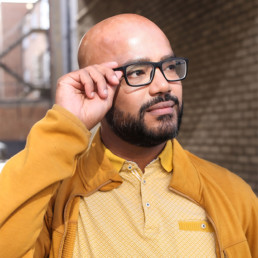
Written by Dr Lalith Wijedoru
Dr Lalith Wijedoru loves stories with impact. He is a coach, public speaker, and facilitator who harnesses the connecting power of stories to improve social health and emotional wellbeing. In his former career as an NHS consultant paediatrician in emergency medicine, he was part of multiple national award-winning teams in staff engagement using this storytelling approach. Lalith's storytelling consultancy Behind Your Mask now supports employees across multiple work sectors including tech, law, finance, education, healthcare, and the arts.
It’s the interview question that every medical school applicant is expecting to be asked: “Why do you want to be a doctor?” All around the world, aspiring doctors like me somehow managed to say in one way or another: “I want to help people.” Thankfully, University College London (UCL) Medical School gave me the chance to prove it.
As a paediatrician, I played a crucial role in the health of children by providing treatment, preventing disease and injury, and advocating for them. My medical training made me well-versed in the interplay between mind (mental health) and body (physical health).
The coronavirus pandemic was a tsunami that swept disconnect across the planet. Restrictions on our movement outside the home with limited exercise affected all of our physical health. The seismic shift to online working and video conferencing affected our mental health. For me, the biggest impact was social distancing. That had a detrimental effect on our social health.
Social health is our ability to form and maintain positive relationships: those which are healthy and meaningful. Relationships can be with friends, neighbours, and our work colleagues. Our physical, emotional, and spiritual wellbeing depend on strong social bonds with others. Social distancing and remote working threatened our ability and need to deepen human connections.
When we say ‘find your tribe’, we are harking back to our animal ancestors who recognized there was great safety in surrounding ourselves with those who looked and acted like you. Things that were different represented danger, a potential threat. Xenophobia has clear evolutionary roots linked to survival. There is a sense of unity and belonging when you surround yourself with people who share facets of your identity. People who get you in some way. Others who understand you.
Our modern world has become far less segregated than the rest of the animal kingdom. The diversity that has always been there now, for the most part, co-exists in far closer proximity with far greater visibility than ever before. Social connectivity is far from homogenous, but for all the benefits of living in a diverse community, it comes with its challenges.
Diversity is not just in the more obvious visual protected characteristics of ethnicity, gender, or age. It also means diversity of thought, opinion, and belief. With that comes the potential for clash, conflict, and disconnect. So how can we cultivate meaningful relationships in a world that is disconnected ideologically and politically whilst connected digitally?
The vitriol that is not uncommonly seen on social media, the emotional and physical hostility that plays out in protests and counter-protests, and the division that is preached by certain political leaders all fan the flames of discontent, disagreement, and disconnect. People screaming their opinions at each other without consideration to what someone else has to say. Putting fingers in their ears while reciting ‘la-la-la-la’ to block out alternative views. We live in an age of not listening.
I love my alma mater for many things, but in the decades since graduating I am particularly proud of one of its recent initiatives. A campaign called Disagreeing Well. It includes a public panel discussion series, a podcast called The Bridge, and online courses on critical thinking for diverse communities where conflicting opinions and ideas exist and are expressed.
One of the things I learned from the campaign’s public series was the concept of epistemic humility. Being humble with your assumptions about your own knowledge. Recognizing that your understanding of the world is incomplete. Aware that as a consequence, you may not perceive things as clearly as you think you do.
One of the skills to promote disagreeing well is to listen carefully to each other. Listen with the intention to truly understand someone’s lived experience. Listen not with the intention to reply, fix, or criticize. My storytelling consultancy was born out of a time of great disconnect. I strive to create spaces and opportunities for us to truly listen to each other. To listen to our true, personal stories without interruption, without fear of judgment or reprimand or insult.
So what would my medical school interviewee-self think of the doctor I became? I may not be helping paediatric patients and their families with their physical and mental health anymore, but I am certainly helping people with their social health. Stories have the power to educate, engage, and inspire. One of the powers of stories that I like the most are their powers to connect. We can agree to disagree, but through stories we can kickstart respectful conversations that inevitably lead us to find the things that we do agree on. And that can only be a good thing for diversity.
